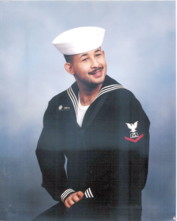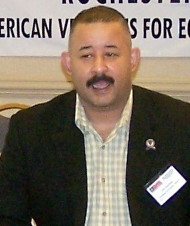 |
Cleveland City Councilman
Joe Santiago
Not An Ordinary Sailor
by
Denny Meyer
|
 |
Ten-year Navy veteran Joe Santiago was elected to the Cleveland (Ohio) City Council as an openly gay Latin-American on November 8th, 2005, representing the city's 14th Ward. Coming from a hardscrabble background, he decided early on not simply to better his own circumstances, but to return home to improve the life on the mean streets in his own community.
He had known he was gay since he was a teenager; yet that simply was not an issue for him when he decided to join the Navy in 1988. What was on his mind was "finding a way out of poverty, getting and education," and bettering his life. Having no money for college or even for college entrance exams, he saw military service as a challenging opportunity through which he could both serve his country and succeed in life. He was no different from any young American seeking to start on his way in life by having the courage and patriotism to volunteer to serve in our armed forces.
In that era, he was among the first generation to grow up believing that he had nothing to hide as a gay person and, as a Latin-American, had all the rights, privileges, and responsibilities as other Americans. As he put it, he believes in "taking the bull by the horns," and taking responsibility for his own progress.
He excelled from the start in Navy boot camp and was in the top five of his class at A School where he was trained as a mess specialist (cook). When volunteers were sought to serve in the Persian Gulf war, he stepped forward and was assigned to the guided missile cruiser USS Leyte (CT55) where he became the Captain's chef. On the day he arrived aboard ship by helicopter, he met what was to become a lifelong friend, a yeoman who had been assigned to help him with his rather large amount of luggage. That, in retrospect, was the first clue, shall we say, that led to the friendship; most young sailors don't tend to arrive with quite so many shoes, clothing, accessories, and a Damron gay guidebook (ooops). As it turned out, he became one of a small cadre of gay Leyte enlisted sailors who held highly responsible positions aboard the ship and buoyed one other through the tasks at hand. While they were not overt, they were open; yet they were all 4.0 sailors, doing their jobs to the best of their ability and excelling.
Petty Officer Second Class Santiago later served in the Pentagon as an aide and private cook to Chief of Naval Operations Admiral Boarda (the first enlisted person to advance all the way to Admiral in the modern US Navy). His final duty was as an enlisted assistant to Admiral Chiles at Offit Air Force Base in Omaha. In all he earned 13 medals and ribbons, including one for the Liberation of Kuwait.
To this day, Councilman Santiago remains deeply proud of his having served his nation and insists that the experience has given him the discipline and fortitude to succeed at community organizing, running for office, as well as actively and effectively serving his constituents. Nevertheless, he and his mates had a terrifying episode, as many of us have had, when the rumors led to their being questioned by a zealous security chief. "It was a horrible experience." At that time, serving in silence was still the rule; there were regular witch hunts for homosexuals. Yet, the group survived that ordeal. When DADT was enacted in the early 1990s they were already long accustomed to supporting one other and carrying on with the goal of excellence in their duties. Yet, at first they were unclear on what it meant; it certainly resulted in their suffering more fear of loosing their careers, and in being more careful of allowing others into their friendship and trust. Through it all, however, Joe Santiago regards his time in the Navy as the most wonderful time in his life. He has no regrets; he left because of knee injuries and moved on, without pause, to his career as an activist.
Asked if gay and lesbian young people should consider joining currently, he said, "Absolutely." He believes that service in the military "can be a tool to make your dreams come true if you have good intentions and a career focus of what you want to be. When you join you become part of a group of young men and women who are the elite, who can excel, and this will enable you throughout life. If you behave professionally at all times while on duty there should be no problems."
Asked about the repeal of DADT so that we may serve openly without fear of loosing our careers, he said that the time will come; the majority of those in the military today are more understanding than even ten years ago. He said that he thinks it's time that the military realize that we are a positive element in our armed forces, that every American who is able to serve should be allowed to do so. It's what the military is about, and we are way behind other countries in this regard. During his time in the service, there were sensitivity classes regarding harassment of women, he noted. A few individuals create the problem due to a lack of education on sensitivity issues, insecurity, and ignorance. "I see in future in which it will be ok to do the job as openly gay," he said.
In his time in the military, his generation were able to form bonding relationships to help one other through traumatic times and the strenuous demands of military life. It is important to realize, he suggests, what those of us who served in the past have done in order to be able to serve. For those serving today, he said, it is not easy considering the active opposition of those on the right. He suggests that you have to go in with the attitude of being focused on improving your life and not let obstacles distract you; keeping your non-professional self separate from your work (just as all service members should). He has used his experience of serving in the military to guide him in serving his community as an elected official, conducting himself in a professional manner in serving the needs of constituents. His personal life, while open, is not primary among the issues that concern those on the streets he represents.
Joe Santiago's record as a community organizer, which led to his election as a councilman, is listed in his biography on the Cleveland City Council website (http://www.clevelandcitycouncil.org/
Home/CouncilMembers/Ward14JoeSantiago/JoeSantiagoBiography/tabid/150/Default.aspx). He studied business management in order to be more qualified to serve as a councilman. He attributes his successful election, in his second run for office, to that, his team, and many others; among those were the support he received from the Victory Fund, Stonewall Democrats, and his local Gay and Lesbian Center. He is working on the provision of Domestic Partner benefits, and has gotten the City Council to support a resolution asking the FDA to reconsider rules that prohibit gay people from donating blood. He works actively with elected colleagues across America on these issues.
Councilman Joe Santiago has a philosophy born of his self-reliant background and experience of "getting the job done" in the Navy. He feels that those who want to improve the community need to "step up to the plate instead of simply complaining." What he is modest about is his leadership ability to motivate people to do that, to organize and involve his constituents to work as a team on the streets to do an overwhelming job to improve their neighborhood. His emphasis is on participation and moving forward, as opposed to allowing negativity to block progress. When he first came home from the military, he said, he saw wonderful festivals but felt that something was missing in his community. He wanted to be an aggressive advocate for betterment. When I asked him exactly how that is done, he quipped, "serve lots of food."
|